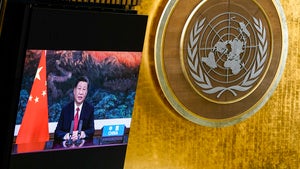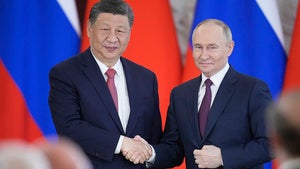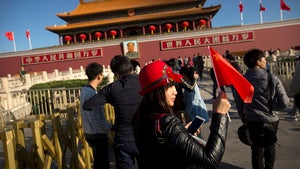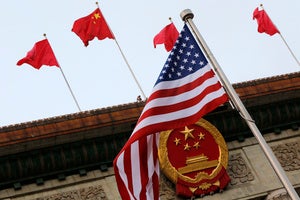Few see the United States as a friend to China, but a majority want Beijing to use a mix of cooperation and containment in its approach to Washington.
New research conducted by the Chicago Council on Global Affairs and The Carter Center offers a rare window into the attitudes of everyday Chinese citizens on international affairs. The survey, conducted April 25 to June 16, 2025, reveals that few Chinese view the United States as a friend to China (17%, 83% not). And though the public is confident in China’s future global influence and economic stature, it is divided over whether the United States or China is currently stronger militarily and economically. Perhaps as a result, the Chinese public wants Beijing to use a mix of cooperation and containment in its approach to Washington. And in a relationship that the Chinese public views as primarily founded on trade and economic ties, the ongoing tension over tariffs and export controls has notable effects on Chinese views of the United States and US-China relations more broadly.
There are numerous challenges in conducting surveys in China, including designing a representative sample, a closed media environment, and the potential for self-censorship. While treating these results with a degree of skepticism is healthy, previous and repeated surveys conducted by other organizations have found similar patterns among Chinese public opinion on international issues.
Key Findings
- Most Chinese (61%) say China should pursue a dual-pronged approach to the United States, undertaking either friendly cooperation or limiting US power when appropriate.
- The Chinese public is divided over which country—China or the United States—is stronger economically or militarily.
- Those who see the United States as a stronger economic power are more likely to favor friendly cooperation with the United States (32% vs. 23% overall). Those who see China as stronger are more likely to favor actively limiting American power (25% vs 15% overall).
- The top two perceived threats to China both involve the United States: 57 percent say a US-China conflict over Taiwan is a major threat, and 55 percent say economic competition with the United States is a major threat.
- Most Chinese say trade between China and the United States does more to strengthen China’s national security (71%) than it does to weaken it (28%).
- Examining responses before and after the May 12 announcement of a US-China trade agreement, views of the United States improved, and support for binational cooperation increased following the announcement.
Few Chinese See the United States as a Friend to China
The last decade has been a difficult period for the US-China relationship. US President Donald Trump, in his first term in office, levied wide-ranging tariffs on Chinese goods in an effort to reset US-China trade relations. President Joe Biden continued these tariffs, escalating some, in what became a focusing element of US foreign policy: great power competition between the United States and China. As US-China relations have taken a sharp turn toward increasingly comprehensive competition, American opinion on China has grown increasingly negative, according to Chicago Council Surveys—and reciprocal views across the Pacific are also quite negative.
Today, the Chicago Council/Carter Center survey finds just 17 percent of Chinese say the United States is a friend to China, while 83 percent say it is not. This is the lowest percentage recorded for all the countries asked about, and it rivals Chinese low opinion of Japan (18% friend, 81% not a friend). These findings are consistent with results from a survey conducted by China’s Tsinghua University in April 2024, which found that 81 percent of Chinese people held unfavorable views of the US government. Other public opinion surveys conducted in China suggest that these views represent a further decline in the Chinese public’s esteem for the United States. A Eurasia Group Foundation poll in 2020, for example, found 39 percent of the Chinese public held a favorable view of the United States (28% unfavorable, 33% neutral). Contemporary negative opinions of the United States hold true across age and educational groups, though younger Chinese and those with a college education or higher are somewhat more likely to view the United States as a friend of China.
At the same time, survey evidence also suggests that these negative attitudes may not be fixed but are responsive to events in the US-China relationship. Because our survey was in the field when Presidents Trump and Xi Jinping agreed to a tentative trade deal, the data allow for pre- and postdeal comparisons. Prior to the agreement, just 13 percent of Chinese viewed the United States as a friend; afterward, that rose to 20 percent—a notable uptick in attitudes.
Economic Relationship Seen as Most Important Basis for US-China Relations
One additional reason the May 12 de-escalation of tariffs agreed to in Geneva affected public attitudes: A majority of Chinese point to trade and economic ties as the most important basis for the US-China relationship (56%), with smaller proportions naming common security interests (27%) or shared values (15%). With the economic relationship acting as the primary ballast for US-China ties, changes in that relationship may have more significant effects on Chinese public attitudes toward the United States.
Although the economic relationship has been strained in recent years, most Chinese say trade between China and the United States does more to strengthen China’s national security (71%) than it does to weaken it (28%). In a notable contrast to American opinion in recent years, Chinese support for US-China trade is consistent with results from Carter Center polling in 2024, despite negative attitudes toward the United States. This view holds across a range of demographic groups. And as with several other questions about US-China relations, the May 12 trade announcement boosted views that US-China trade is good for China’s national security: rising from 68 percent beforehand to 74 percent after the announcement.
Majorities of Chinese View US Economic Competition, Potential Taiwan Conflict as Major Threats
Issues involving the United States lead a list of potential concerns for the Chinese public. Nearly six in 10 (57%) believe a possible conflict between China and the United States over Taiwan represents a major threat to China, while a quarter (24%) say it is a minor threat, and just 18 percent do not view it as a threat at all. About the same proportion say economic competition between China and the United States is a critical threat to China (55%, vs. 26% minor threat, 18% not a threat).
Those who are interested in international news and those who hold a college degree are more likely to view both issues as a major threat to China. This pattern holds across most of the potential threats to China asked about in the question (see appendix figures A and B).
Chinese Public Divided on Assessing US Economic and Military Power
The Chinese public is split over whether China or the United States is the stronger power, both economically and militarily. When it comes to military power, a plurality (39%) say the two nations are about equal. The rest of the public is divided, with similar proportions viewing China (31%) and the United States (29%) as the stronger military power. Economically, a narrow plurality (37%) view the United States as the stronger power, with a third (32%) viewing China as the stronger, and another three in 10 (31%) saying the United States and China are about equal.
While views of comparative US-China power are generally similar across age cohorts, those with a higher level of education are more likely to say that the United States is the stronger economic and military power. Half of Chinese with a bachelor’s degree or higher (49%) say the United States is the stronger economic power, and a third (36%) say the same for the military balance of power.
Most Want China to Pursue a Balanced Approach to the United States
Most Chinese say their country should pursue a balance of approaches to the United States, undertaking friendly cooperation when appropriate and limiting US power when appropriate (61%). Fewer say Beijing should pursue primarily a policy of friendly cooperation (23%) or a policy of actively limiting US power (15%). This preference for a balanced approach holds true across a variety of demographic groups, though men are more likely than women to favor pursuing friendly cooperation without conditions.
The trade deal reached in May between Washington and Beijing also had a distinct effect on the Chinese public’s preferred approach to the United States. Prior to the deal’s announcement, just 18 percent of the public wanted Beijing to pursue a policy of friendly cooperation; this rose to 28 percent following the May 12 trade deal. This again indicates that Chinese public opinion toward the United States and US-related policies is sensitive to developments in the US-China relationship.
Another factor affecting public policy preferences is the perception of the US-China balance of power. Those who see the United States as a stronger economic power are more likely to favor friendly cooperation with the United States (32% vs. 23% overall). Those who see China as stronger are more likely to favor actively limiting American power (25% vs 15% overall). And those who see the two nations as equally matched economically are the most likely to favor pursuing a balanced policy (71%). Similarly, those Chinese who see the United States as the stronger military power are more likely to favor pursuing friendly cooperation with the United States (36% vs. 23% overall)—though there are no significant differences between those who say China is stronger and those who see the two militaries as evenly matched.
Conclusion
On the one hand, the Chinese public clearly does not see the United States as a friend to China. In that, they are matched by Americans’ own increasingly-negative views of China. However, the Chinese public is not unremittingly hostile toward the United States, and like the attitudes of most Americans toward China, they want to see their government pursue a balanced approach in relations with Washington. Additionally, the Chinese public’s views of the United States and US policy are notably responsive to news and developments in the US-China relationship. This suggests that should Beijing and Washington succeed in their ongoing trade and tariff negotiations, Chinese public opinion could become more favorable toward the United States—and should they fail, those views could turn even more negative. Moreover, many among the Chinese public see their country as America’s equal militarily and economically—and significant portions believe Beijing has the upper hand on both fronts. Though the Chinese public is hardly spoiling for a confrontation with Washington and views potential economic and military conflicts with the United States as critical threats, this polling suggests they are unlikely to be cowed by American pressure.
This analysis is based on data from a poll conducted by NORC from April 25 through June 16, 2025, using a random digit dialing (RDD) CATI telephone methodology among mainland China’s adult population. The final poll includes 1,002 completed surveys with adults aged 18 and over, excluding 52 test cases. The design effect is 1.77 with an overall margin of sampling error of ±4.12 percentage points at the 95 percent confidence level.
The RDD sample frame was created using the national numbering plan provided by the Ministry of Industry and Information Technology (MIIT). The sample included only mobile phone numbers used for residential services and excluded those for commercial services. The sample frame excluded Hong Kong, Macau, and Taiwan.
The sampling frame of active mobile phone numbers was drawn from the four government-owned mobile service networks, which have a total over 1.75 billion subscriptions. The numbers were pre-screened to include working non-business numbers. The sample frame included 91,806 numbers stratified by the proportion of each network. The following mobile service networks were used:
- CBN: 1.83%
- China Mobile: 56.59%
- China Telecom: 22.86%
- China Unicom: 18.72%
There was no within-household sampling and so any adult age 18 or over who picked up the call was eligible to take the survey. There was a maximum of eight attempts to reach an adult for each number.
The field work was conducted by a NORC-trained, phone data collection firm using live interviewers. Interviewers were at least 20 years of age, mostly women. Interviews were conducted in Mandarin, however the field staff included interviewers with sufficient fluency in major Chinese dialects (such as Cantonese or Shanghainese) to conduct interviews with respondents who use a dialect other than Mandarin. Only interviewers who were born in mainland China were hired for the project, to avoid the potential impact of language/dialect on respondent cooperation.









Related Content
 Public Opinion
Public Opinion
Whether Beijing should take any leadership position on the world stage, however, is an overwhelming “yes.”
 Public Opinion
Public Opinion
Everyday Chinese citizens view international trade as good for the economy and job creation, and say China should pursue a policy of global free trade.
 Public Opinion
Public Opinion
Other neighboring countries, including Japan, India, the Philippines, and Vietnam, are viewed less favorably.
 Public Opinion
Public Opinion
New polling from the Chicago Council on Global Affairs and The Carter Center offers a rare window into how Chinese citizens view China's global role and foreign policy.


